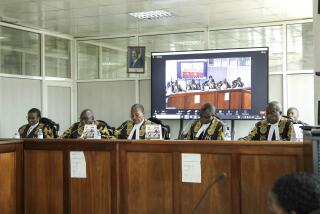Appeals Court Rejects Homosexual’s Distress Suit
SAN FRANCISCO — Unlike married couples and parents, homosexuals cannot recover damages for emotional distress they suffer when their sexual partners are injured, a state Court of Appeal ruled Wednesday by a vote of 2 to 1.
In the first appellate ruling on the novel issue, the panel held that homosexual couples could not establish the same “close relationship” in which the law allows spouses and parents to bring suit for witnessing a traumatic injury or death of their partner or child.
The court noted that even if a “de facto marital relationship” were established by such couples, it could not be recognized because state law defines a legal marriage as between a man and a woman.
Appellate Justice James B. Scott, writing for the majority, said that expanding the law to allow homosexuals to sue in such circumstances would invite inconsistent results as judges and juries were forced to make completely subjective judgments on whether these couples had established a “close relationship.”
In dissent, Appellate Justice Clinton W. White said he disagreed with the majority’s conclusion that a homosexual relationship “cannot be of a significant nature” to sustain a suit for damages. Courts could legitimately decide whether such relationships were close enough to warrant recovery of damages, he said.
The decision also contained an unusual appeal to the Legislature to decide whether persons in “committed relationships”--both heterosexual and homosexual--should enjoy some or all of the legal rights the state has long reserved for married couples. That question, wrote Appellate Justice Betty Barry-Deal in a concurring opinion, is “a matter of public policy demanding the attention of the Legislature.”
Among other things, the lawmakers should weigh whether unmarried couples should be entitled to bring suit in wrongful-death and emotional distress cases, as well as share in such employee benefits as family health care, group insurance and unemployment benefits, she said. Any extension of such rights is the responsibility of the Legislature, not the courts, she observed.
The ruling came as the legal debate over the rights of the unmarried has intensified in recent years in California courts.
In a landmark ruling in 1976 in the so-called “palimony” case of actor Lee Marvin, the state Supreme Court held that under contract law, an unmarried person could be entitled to financial support under an agreement that existed before the couple broke up.
In a more recent case, the state high court is expected to rule soon on whether an unmarried man can sue for the loss of companionship and for the emotional distress he suffered in the negligent accidental death of the woman with whom he was living.
The case decided Wednesday arose from a suit brought by Gary Coon of San Francisco against the driver of a municipal bus. Coon claimed that his “exclusive life partner,” Robert Ervin, had been punched in the face by the driver in a dispute when the two tried to board the bus.
Coon sought damages for what he said was the intentional and negligent infliction of “great mental and emotional distress” he suffered over the alleged assault on his companion.
Since 1968, courts in California have permitted emotional distress suits when there was a “close relationship” between the victim of injury or death and the person who witnessed it. Thus far, however, courts have largely limited such actions to cases involving a husband and wife, parent and child, grandparent and grandchild and other close relatives.
Coon’s suit was dismissed in San Francisco Superior Court and the appellate court Wednesday upheld that ruling, finding that he had failed to establish the “close relationship” required under the law.
Scott, in the majority opinion, noted that legal scholars had expressed concern over expanding the limits beyond close relatives to include distant relatives, friends or even mere bystanders to an accident.
White, while asserting that some homosexual relationships could provide a legitimate basis for a suit, joined the court in ruling that in this case, Coon was not entitled to sue because the injury to his companion did not appear substantial.
“Since (Coon) does not plead any medical injury to himself or his significant other, there is nothing in the complaint to support the genuineness of the claim,” White wrote.
More to Read
Sign up for Essential California
The most important California stories and recommendations in your inbox every morning.
You may occasionally receive promotional content from the Los Angeles Times.









